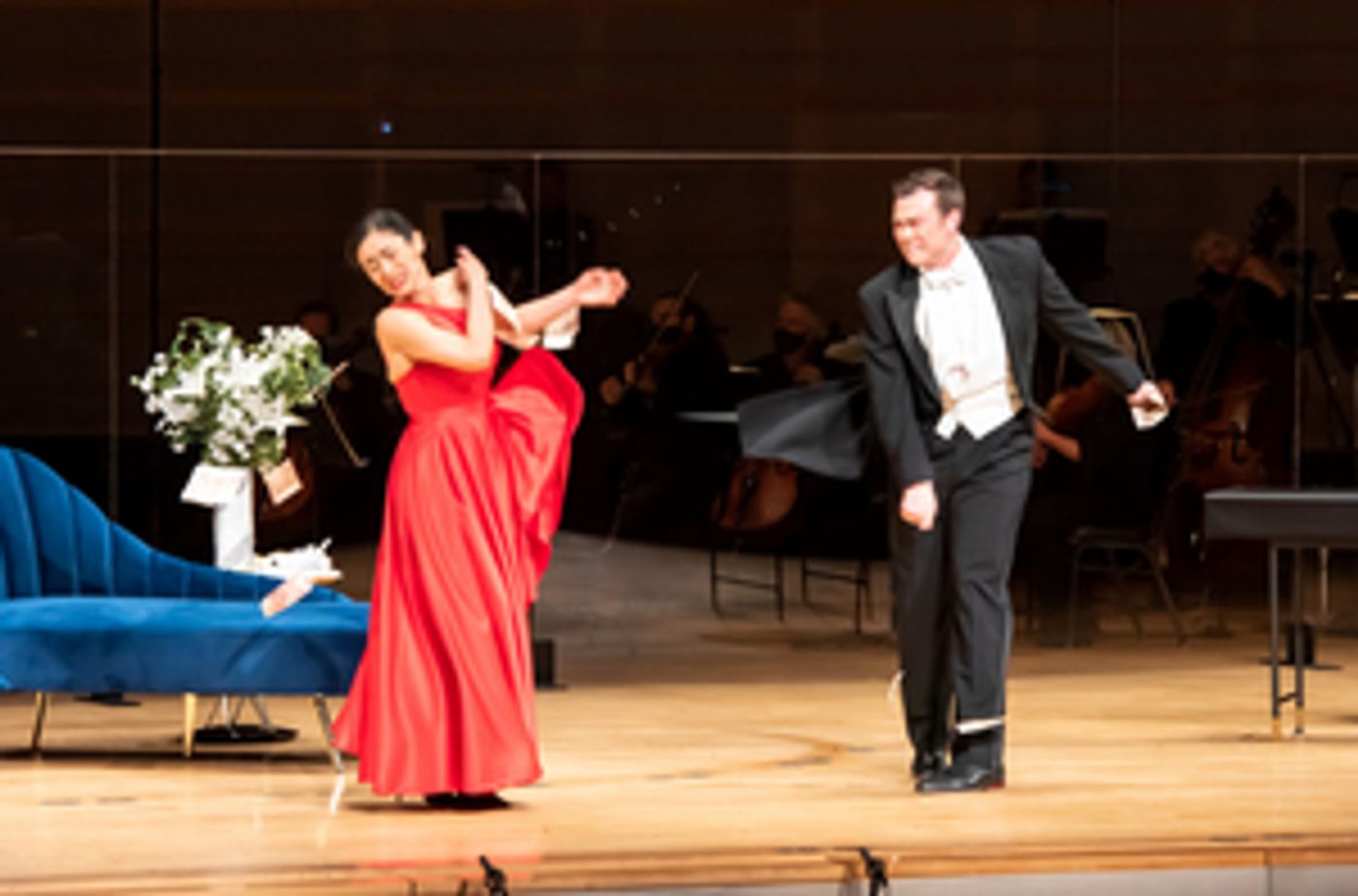Review: PACIFIC SYMPHONY LA TRAVIATA at Home Computer Screens
Gorgeous Music and Fine Acting in Online Opera
 On June 26, 2021, I viewed the Pacific Symphony Orchestra's semi-staged version of Giuseppe Verdi's La Traviata (The Lost One) filmed at the Renée and Henry Segerstrom Concert Hall in Costa Mesa, CA. This opera's title role requires a charismatic soprano who can sing coloratura as well as dramatic music and an actress who can pull the audience into the opera's stark drama. Cecilia Violetta Lopez is an artist who can fulfill all these needs as she proves in Pacific Symphony's film.
On June 26, 2021, I viewed the Pacific Symphony Orchestra's semi-staged version of Giuseppe Verdi's La Traviata (The Lost One) filmed at the Renée and Henry Segerstrom Concert Hall in Costa Mesa, CA. This opera's title role requires a charismatic soprano who can sing coloratura as well as dramatic music and an actress who can pull the audience into the opera's stark drama. Cecilia Violetta Lopez is an artist who can fulfill all these needs as she proves in Pacific Symphony's film.
Music Director Carl St.Clair conducted a thoughtful rendition of the overture. Robert Neu directed a staging that allowed for distanced instrumentalists to perform in shadow. Interpreters of main roles to sang and acted at the well-lit front of the stage. There was no scenery and the chorus was eliminated. Soprano Chelsea Chaves and baritone Matthew Kellaway sang small parts and chorus lines when necessary. Dominating center stage was a blue chaise longue that functioned as a couch and eventually a bed. The costumes were present day, but fit the places described by the libretto.
Missing was the live audience that has always been present at Pacific Symphony's previous opera presentations, but that could not be helped in the time of COVID. Without physical contact, soprano Cecilia Violetta Lopez as Violetta and tenor John Riesen as Alfredo, made us believe in their characters' affection and desire for each other.
Lopez began to show her vocal ability with this role when she sang the thoughtful "A, forsé lui" ("Maybe it could be him") followed by her coloratura-studded mental U-turn, "Sempre libera" ("Forever free"). Riesen was a slow starter, but once he found some vocal security, he made viewers appreciate his unceasing love for Violetta. He sang his second act aria, "Deh miei bollenti spiriti" with ebullience, and in the ensuing cabaletta he expressed his sudden fall from grace.
Jeffrey Mattsey was a commanding Germont with a bronze-toned resonant sound, but he never succeeded in displacing Violetta's dignity. Mattsey and Lopez were dueling charismatic artists of the first order whose dialogue produced a fascinating act. Happily, their opulent voices, excellent diction, and consummate acting skills are recorded and may be available for years to come. Mattsey's aria, "Di Provenza, il mar, il suol" ("The sea and soil of Provence") showed that his voice has poignant overtones as well as a dramatic exterior.
In Act three, we saw the violent confrontation between Alfredo and Violetta and it could not have been more riveting. It was anger in the midst of love, fomented by cruel social mores. It leaves Violetta alone to face her illness as she sings her "Addio del passato" ("Good-bye to the past"). I've seen and heard this aria hundreds of times but never was I more moved by it than last night. Even today, there's a great deal of truth to this story.
Music Director Carl St.Clair has a good feel for opera. He brings out the drama in his orchestral accompaniment of the voices as well as in the purely instrumental passages. He featured many of Verdi's inner melodies while being careful not to override the voices in the crescendos.
The Pacific Symphony film of La Traviata can be streamed for $25 per household through July 4, 2021. Access may be purchased by phone only through the Symphony box office which can be reached at (714) 755-5799 Monday-Friday from 9 a.m. to 5 p.m.
Photo of Cecilia Lopez as Violetta and John Riesen as Alfredo courtesy of Pacific Symphony.
Reader Reviews

Videos

